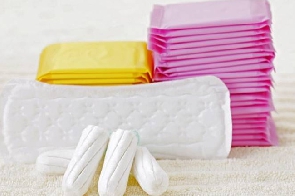Opinions of Saturday, 9 September 2023
Columnist: Agnes Adwoa Anima
The struggle for dignity: Unraveling the 'Luxury Tax' on sanitary pads in Ghana
In the 21st century, one would expect society to have moved beyond archaic norms and discriminatory practices. However, it is disheartening to acknowledge that in some parts of the world, women still face inequality and financial burdens due to policies that treat essential feminine hygiene products as luxury goods.
In Ghana, a country known for its rich cultural heritage and vibrant communities, sanitary pads are still subject to taxation, exacerbating the
challenges faced by women in accessing affordable menstrual hygiene products.
In this article, I explore the issue of taxing sanitary pads as luxury goods in Ghana and its implications on women's health, education, and economic empowerment.
Menstruation is a natural biological process experienced by half of the world's population. It is integral to reproductive health and demands appropriate care and attention. Menstruation has long been stigmatised in various cultures, perpetuating the notion that it is a shameful and impure process.
This taboo surrounding menstruation has led to various misconceptions, adversely
impacting women's lives and influencing policy decisions. One such consequence of this cultural stigma is the classification of sanitary pads as luxury items, subjecting them to taxation. For many women and girls, access to hygienic menstrual products like sanitary pads is crucial for maintaining their health and dignity.
Luxury tax – its impact on society
Unfortunately, a lack of awareness and gender sensitivity has resulted in many nations' menstruation hygiene products being branded as luxury or non-essential commodities. The classification has far-reaching implications for women's physical health, financial security, and social position.
The phrase 'luxury tax' may conjure up ideas of pricey watches, fancy apparel, or high-end automobiles. Surprisingly, it has also been used on sanitary pads in some nations. In Ghana, these essential menstruation items are subject to a value-added tax (VAT) applied to luxury goods. This ruling emphasised that women's cleanliness and health were a luxury rather than a fundamental human right.
In today's sophisticated society, it is difficult to conceive that a necessary item like sanitary pads, critical for women's health and cleanliness, could be taxed and even classified as a luxury item. This is, shockingly, the reality in some parts of the world. The government's decision to tax sanitary pads as luxury items have created a heated debate, exposing the more significant issue of gender inequality and emphasising immediate reform.
In Ghana, activists, women's rights organisations, and concerned people have been outspoken in opposing the government's proposal to charge sanitary pads. The 17.5% VAT charged on sanitary pads has prompted concerns about gender equality and social fairness. Tax supporters believe sanitary pads are unnecessary and can be considered luxury items compared to other essentials.
However, this viewpoint ignores the critical role of menstruation hygiene in women's health and well-being. It promotes the stigma associated with
menstruation and fosters the assumption that it should be avoided rather than embraced and supported. Implementing such a charge on basic menstruation supplies disproportionately impacts low-income women and girls struggling to buy
these things.
The Ghanaian government effectively penalises women for natural biological activity by classifying sanitary pads as luxury items. Many women, particularly those from low-income households, cannot buy these products due to the luxury tax imposed on the product, which significantly impacts the prices of sanitary pads. As a result, some women resort to adopting unsanitary alternatives during their periods, endangering their health and increasing the risk of infection.
Furthermore, the financial burden of acquiring sanitary pads may cause women to
prioritise other vital requirements above menstrual hygiene, jeopardising their overall well-being.
The tax's increased price burden disproportionately impacts underprivileged populations, preventing many people from accessing these essential supplies. Furthermore, a lack of access to excellent sanitary goods may severely impact reproductive health, resulting in long-term health difficulties for women.
Women's health depends on having access to safe and sanitary menstrual products. The inability to buy good sanitary pads may force women to use unsanitary alternatives, raising the risk of infection and other health problems. Young girls from low-income families frequently miss school during their periods due to a lack of sanitary pads. This perpetuates the education gender gap and restricts future achievement and empowerment.
The luxury tax on sanitary pads fosters the notion that women's health is unimportant, contributing to gender inequity in many nations. According to many international accords, every woman has the right to health and dignity.
Taxing a necessary menstruation product violates these fundamental human rights.
The change we need
Challenging old policies and fighting for constructive change is critical to developing a fairer, more inclusive society. The struggle against the luxury tax on sanitary pads in Ghana has gained traction because of the efforts of numerous advocacy groups, non-governmental organisations (NGOs), and concerned citizens. To be successful with this advocacy, a couple of things need to be done.
Firstly, there is a need to continue raising awareness about the harmful impact of the luxury tax on sanitary pads. Convenings, social media efforts, and educational initiatives can all dispel myths and create public support.
Secondly, it is critical to engage policymakers and authorities in reconsidering their attitude toward taxing sanitary pads. Governments should recognise menstrual hygiene items as requirements and exempt from the luxury tax. The
government of Ghana can enact policies that give subsidies or financial assistance to guarantee that sanitary pads are available to all women, regardless of economic status. Thirdly, the Private Sector can help by financing projects that supply low-cost sanitary supplies to underserved populations.
Finally, providing comprehensive education in schools and communities can aid in
de-stigmatizing menstruation and promoting healthy menstrual hygiene practices.
Conclusion
In Ghana, the "luxury tax" on sanitary pads is a financial burden and reflects the more significant gender gap and lack of awareness surrounding women's health issues. We can break down the obstacles that impede women from living healthy, dignified lives by identifying menstrual hygiene products as necessities rather than luxuries. Governments, organisations, and individuals must collaborate to establish a society prioritising women's health and well-being. The removal
of the luxury tax on sanitary pads is a step toward attaining gender equality and honouring the dignity of women in Ghana and worldwide.













